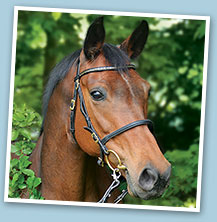
Press room
2015 press releases
Posted: 27/04/15
Petplan Equine stats turn the spotlight on Equine Grass Sickness
Petplan Equine, a leading UK specialist equine insurance provider, is alerting horse owners to the incidence of Equine Grass Sickness following the release of its latest claims’ statistics. In 2014, Petplan Equine paid out almost £37,000 in Equine Grass Sickness related claims turning the spotlight on this rare but most often, fatal condition.
Every month last year Petplan Equine received a claim for Equine Grass Sickness, a condition known now to be caused by a toxin produced by a clostridia bacterium, the same bacteria that, in different circumstances, can cause Botulism. The insurer received the highest number of claims in June and July however Petplan Equine’s veterinary expert Gil Riley warns that, while the condition is most prevalent between April and September – with a spike in May - it can strike at any time of year.
“The bacterium lives in the soil and when it spreads onto the grass itself it can be ingested by horses. The toxin that is produced by the bacterium after it has been consumed interferes with the nerves in the horse’s intestine causing severe dysfunction and colic which is almost always fatal” says Gil.
Grass sickness can present in one of three ways:
- Peracute: The horse is found dead in the field having presumably ingested large amounts of the bacteria .
- Acute: The horse usually presents at first with moderate abdominal discomfort but a pulse that is abnormally high.
- Chronic: This is the form of the condition from which affected horses can sometimes recover. It comes on slowly, usually two to three days, and presents as low grade colic with rapid weight loss. Other signs include: a droopy eyelid, dry sticky nasal discharge and faeces balls that are hard and small.
Recovery from the Chronic form may be possible but only with intensive care and pain relief and providing the horse is still able to swallow; the swallowing reflex can be affected by the toxin and if this happens then even the chronic presentation will be fatal.
Prevention:
- Avoid introducing new (usually young) stock onto paddocks that have previously produced grass sickness or where the soil has been disturbed – for drainage works for example.
- Avoid a grass-only diet; feed hay in the field or bring horses in at night.
Petplan Equine’s Senior Marketing Executive Charlotte Collyer says: “The statistics speak for themselves and show us that what was previously thought to be a summer-specific condition is something that affects horses throughout the year.”
“We understand an, Equine Grass Sickness vaccine is currently being trialled. Until then we want to remind horse owners that prevention is of paramount importance as this is a condition for which there is often no cure” explained Charlotte.
For more information on Grass Sickness and how to spot signs and symptoms along with details about the Equine Grass Sickness vaccine trial visit www.petplanequine.co.uk/events/equine-grass-sickness.asp
For more information please contact:
| Name | Telephone | |
| Charlotte Collyer | 0208 707 8335 | charlotte.collyer@allianz.co.uk |
- Petplan Equine offers comprehensive insurance cover for horses and ponies aged from 30 days. Established 25 years ago, Petplan Equine understands the evolving equestrian market and strives to enhance knowledge and understanding of the equine world through employing horse enthusiasts and working closely with the equine industry.
- Petplan Equine is part of the Petplan brand. Founded in 1976, Petplan is the UK's largest pet insurance provider, offering comprehensive cover for dogs, cats, rabbits and horses.
Note to editors:
Media enquiries: for further information, please contact:
Andrea Worrall at The GPC by email: panda@thegpc.co.uk t: (01608) 654040



